![]()

Four Sons (1928)
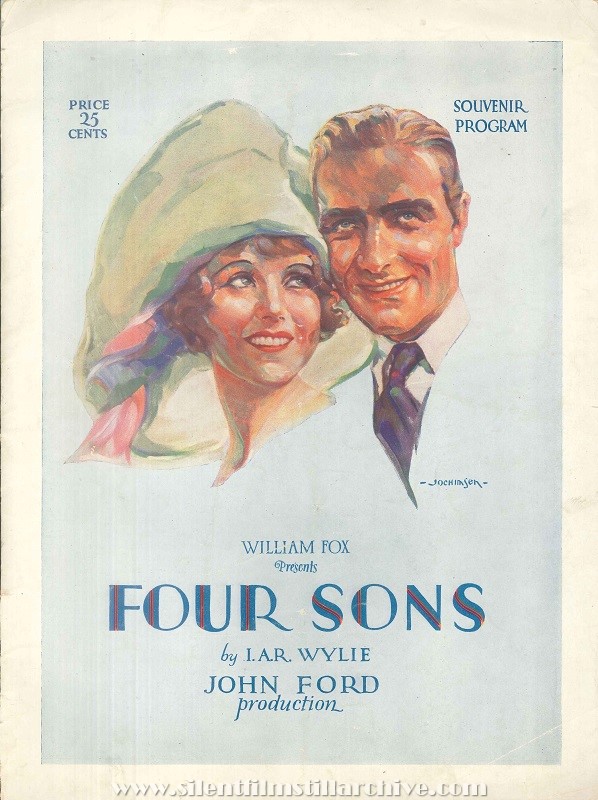
Price 25 Cents Souvenir Program
William Fox
presents
FOUR SONS
by I. A. R. Wylie
JOHN FORD production
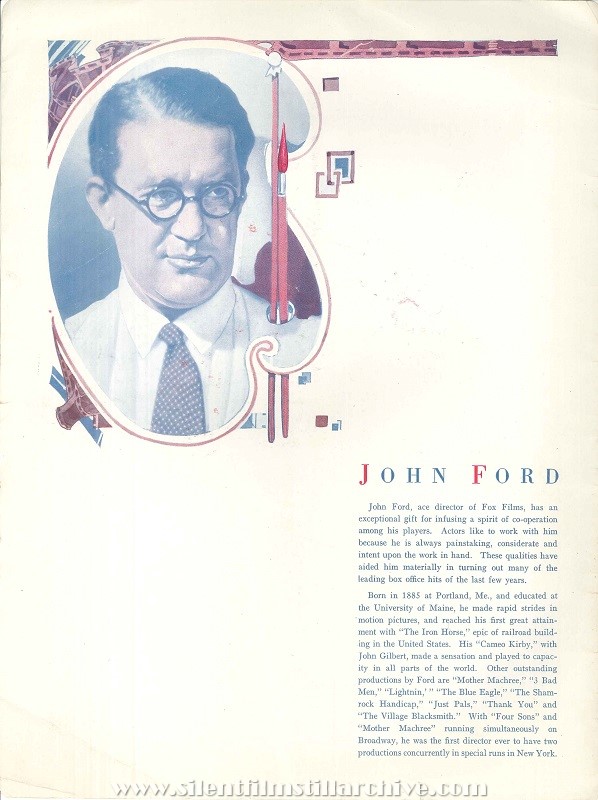
JOHN FORD
John Ford, ace director of Fox Films, has an exceptional gift for infusing a spirit of co-operation among his players. Actors like to work with him because he is always painstaking, considerate and intent upon the work in hand. These qualities have aided him materially in turning out man of the leading box office hits of the last few years.
Born in 1885 at Portland, Me., and educated at the University of Maine, he made rapid strides in motion pictures, and reached his first great attainment with "The Iron Horse," epic of railroad building in the United States. His "Cameo Kirby," with John Gilbert, ade a sensation and played to capacity in all parts of the world. Other outstanding productions by Ford are "Mother Machree," "3 Bad Men," "Lightnin," "The Blue Eagle," "The Shamrock Handicap," "Just Pals," "Thank You and "The Village Blacksmith." With "Four Sons" and "Mother Machree" running simultaneously on Broadway, he was the first director ever to have two productions concurrently in special runs in New York.
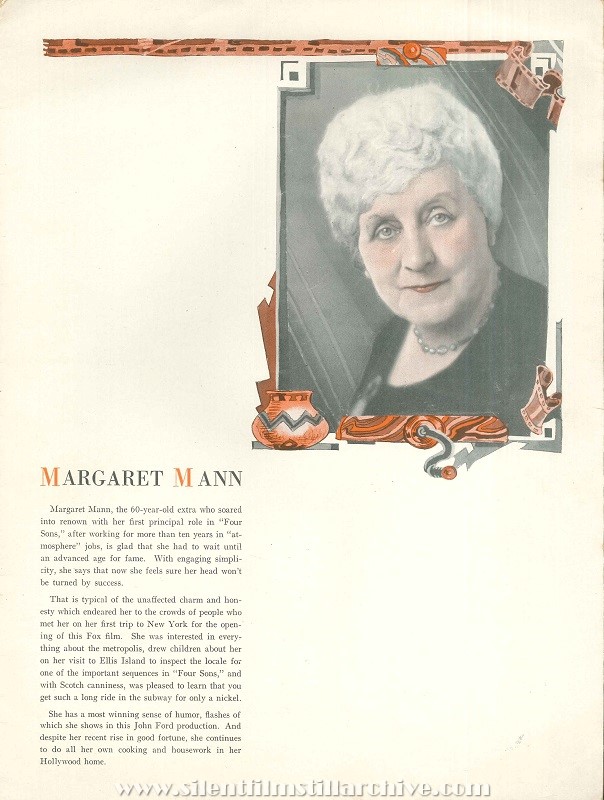
MARGARET MANN
Margaret Mann, the 60-year-old extra who soared into renown with her first principal role in "Four Sons," after working for more than ten years in "atmosphere" jobs, is glad toat she had to wait until an advanced age for fam.e. With engaging simplicity, she says that now whe feels sure her head won't be turned by success.
This is typical of the unaffected charm and honesty which endeared her to the crowds of people who met her on her first trip to New York for the opening of this Fox film. She was interested in everything about the metropolis, drew children about her on her visit to Ellis Island to inspect the locale for one of the important sequences in "Four Sons," and with Scotch canniness, was pleased to learn that you get such a long ride in the subway for only a nickel.
She has a most winning sense of humor, flashes of which she shows in this John Ford production. And despite her recent rise in good fortune, she continues to do all her own cooking and housework in her Hollywood home.
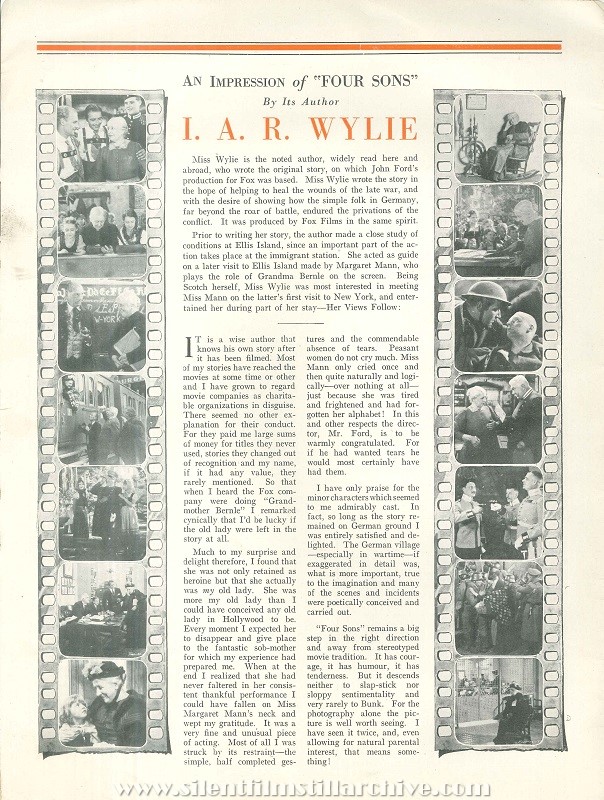
An Impression of "FOUR SONS"
By Its Author
I. A. R. WYLIE
Miss Wylie is the noted author widely read here and abroad, who wrote the original story, on which John Ford's production for Fox was based. iss Wylie wrote the story in the hope of helping to heal the wounds of the late war, and with the desire of showing how the simple folk in Germany, far beyond the roar of battle, endured the privations of the conflict. It was produced by Fox Films in the same spirit.
Prior to writing her story, the author made a close study of conditions at Ellis Island, since an iportant part of the auction takes place at the immigrant station. She acted as guide on a leter visit to Ellis Island made by Margaret Mann, who plas the role of Grandma Bernle on the screen. Being Scotch herself, Miss Wylie was most interest in meeting Miss Mann on the latter's first visit to New York, and entertained her during part of her stay -- Her Views Follow:
IT is a wise author that knows his own stry after it has been filmed. Most of my stories have reached the movies at some time or other and I have grown to regard movie companies as charitable organizations in disguise. There seemed no other explanation for their conduct. For they paid me large sums of money for titles they never used, stories they changed out of recognition and my name, if it had any value, they rarely mentioned. So that when I heard the Fox company were doing "Grandmother Bernle" I remarked cynically that I'd be lucky if the old lady were left in the story at all.
Much to my surprise and delight therefore, I found that she was not only retained as heroine but that she actually was my old lady. She was more my old lady than I could have conceived any old lady in Hollywood to be. Every moment I expected her to disappear and give place to the fantastic sob-mother for which my experience had prepared me. When at the end I realized that she had never faltered in her consistent thankful performance I could have fallen on Miss Margaret Mann's neck and wept my gratitude. It was a very fine and unusual piece of acting. Mos of all I was struck by its restraint -- the simple, half completed gestures and the commendable absence of tears. Peasant women do not cry much. Miss Mann only cried once and then quite naturally and locically -- over nothing at all -- just because she was tired and frightened and had forgotten her alphabet! In this and other respects the director, Mr. Ford, is to be warmly congratulated. For if he had wanted tears he would most certainly have had them.
I have only priase for the minor characters which seemed to me admirably cast. In fact, so long as the story remained on German ground I was entirely satisfied and delighted. the German village -- especially in wartire -- if exaggerated in detail was, what is more important, true to the imagination and many of the scenes and incidents were poetically conceived and carried out.
"Four Sons" remains a big step in the right direction and away from stereotyped movie tradition. It has courage, it has humor, it has tenderness. But it descends neither to slap-stick nor sloppy sentimentality and very rarely to Bunk. For the photography alone the picture is well worth seeing. I have seen it twice, and, even allowing for natural parental interest, that means something!
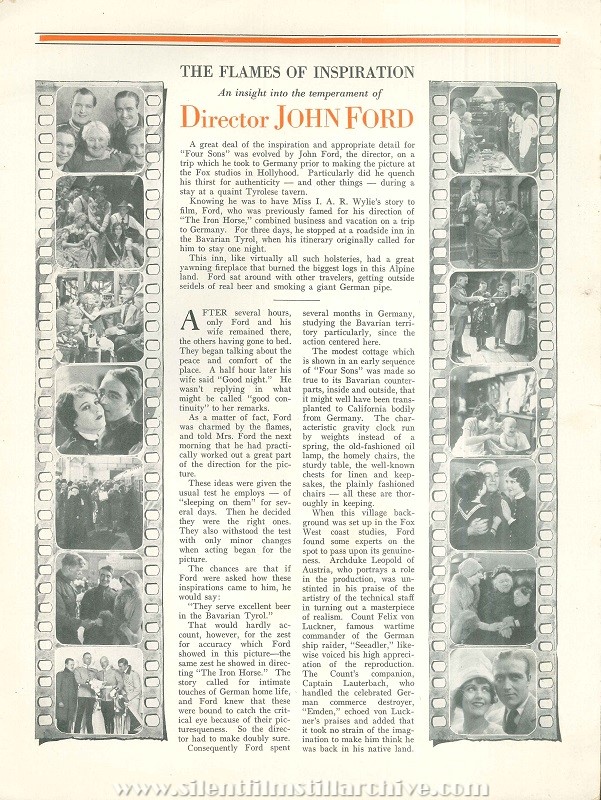
THE FLAMES OF INSPIRATION
An insight into the temperament
of
Director JOHN FORD
A great deal of the inspiration and appropriate detail for "Four Sons" was evolved by John Ford, the director, on a trip which he took to Germany prior to making the picture at the Fox studios in Hollyhood (sic). Particularly did he quench his thirst for authenticity -- and other things -- during a stay at a quaint Tyrolese tavern.
Knowing he was to have Miss I. A. R. Wylie's story to film, Ford, who was previously famed for his direction of "The Iron Horse," combined business and vacation on a trip to Germany. For three days, he stopped at a roadside inn in the Bavarian Tyrol, when his itinerary originally called for him to stay one night.
This inn, like virtually all such holsteries, had a great yawning fireplace that burned the biggest logs in this Alpine land. Ford sat around with other travelers, getting outside seidels of real beer and smoking a giant German pipe.
After several hours, only Ford and his wife remained there, the others having gone to bed. They began talking about the peace and comfot of the place. A half hour later his wife said "Good night." He wasn't replying in what might be called "Good continuity" to her remarks.
As a matter of fact, Ford was charmed by the flames, and told Mrs. Ford the next morningthat he had practically worked out a great part of the direction for the picture.
These ideas were given the usual test he employs -- "of sleeping on them" for several days. Then he decided they were the right ones. They also withstood the test with only minor changes when acting began for the picture.
The chances are that if Ford were asked how these inspirations came to him, he would say:
"They serve excellent beer in the Bavarian Tyrol."
That would hardly account, however, for the zest for accuracy which Ford showed in this picture -- the same zest he showed in direcing "The Iron Horse." The story called for intimate touches of German home life, and Ford knew that these were bound to catch the critical eye because of their picturesqueness. So the director had to make doubly sure.
Consequently, Ford spent several months in Germany, studying the Bavarian territory particularly, since the action centered here.
The modest cottage which is shown in an early sequence of "Four Sons" was made so true to its Bavarian counterparts, inside and outside, that it might well have been transplanted to California bodily from Germany. The characteristic gravity clock run by weights instead of a spring, the old-fashioned oil lamp the homely chairs, the sturdy table, the well-known chests for linen and keepsakes, the plainly fashioned chairs -- all these are thoroughly in keeping.
When this village background was set up in the Fox West coast studies, Ford found some experts on the spot to pass upon its genuineness. Archduke Leopold of Austria, who portrays a role in the production, was unstinted in his praise of the artistry of the technical staff in turning out a masterpiece of realism. Count Felix von Luckner, famous wartime commander of the German ship raider, "Seeadler," likewise voiced his high appreciation of the reproduction. The Count's companion, Captain Lauterbach, who handled the celebrated German commerce destroyer, "Emden," echoed von Luckner's praises and added that it took no strain of the imagination to make him think he was back in his native land.
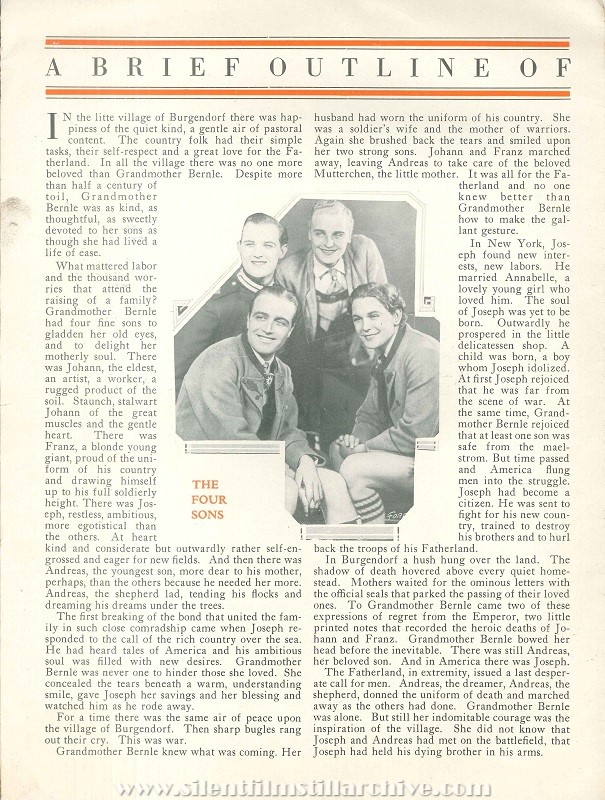
A BRIEF OUTLINE OF THE STORY OF "FOUR SONS"
IN the little village of Burgendorf there was happiness of the quiet kind, a gentle air of pastoral content. The country folk had their simple tasks, their self-respect and a great love for the Fatherland. In all the village there was no one more beloved than Grandmother Bernie. Despite more than half a cenntury of toil, Grandmother bernie was as kind, as thoughtful, as sweetly devoted to her sons as though she had lived a life of ease.
What mattered labor and the thousand worries that attend the raising of a family? grandmother Bernie had four fine sones to gladden her old eyes, and to delight her motherly soul. There was Johan, the eldest, ann artist, a worker, a rugged product of the soil. Staunch, stalwart Johann of the great muscles and the gentle heart. There was Franz, a blonde young giant, proud of teh uniform of his country and drawing hiself up to his full soldierly height. There was Joseph, restless, ambitious, more egotistical than the others. At heart kind and considerate but outwardly rather self-grossed and eager for new fields. And then there was Andreas, the youngest son, more dear to his mother, perhaps, than the others because he needed her more. Andreas, the shepherd lad, tending his flocks and dreaing his dreams under the trees.
The first breaking of the bond that united the family in such close comradship came when Joseph responded to the call of the rich country over the sea. He had heard tales of America and his ambitious soul was filled with new desirs. Grandmother Bernle was never one to hinder those she loved. She concealed the tears beneath a warn, understanding smile, gave Joseph her savings and her blessing and watched hi as he rode away.
For a time there was the same air of peace upon the village of Burgendorf. Then sharp bugles rang out their cry. This was war.
Grandmother Bernle knew what was coing. Her husband had worn the uiform of his country. She was a soldier's wife and the mother of warriers. Again she brushed back the tears and smiled upon her two strong sons. Johann and Franz arched away, leaving Andreas to take care of the beloved Mutterchen, the little mother. It was all for the Fatherland and no one knew better than Grandmother Bernle how to make the gallant gesture.
In New York, Joseph found new interests, new labors. He married Annabelle, a lovely young girl who loved him. The sould of Joseph was yet to be born. Outwardly he prospered in the little delicatessen shop. A child was born, a boy whom Joseph idolized. At first Joseph rejoiced that he was far fro the scene of war. At the same time, Grandmother Bernie rejoiced that at least one sone was safe from the maelstrom. But time passed and America flung men into the struggle. Joseph had become a citizen. he was sent to fight for his new country, trained to destroy his brothers and to hurl back the troops of his Fatherland.
In Burgendorf a hugh hung over the land. The shadow of death hovered above every quiet homstead. Mothers waited for the ominous letters with the official seals that parked the passing of their loved ones. To Grandmother Bernle came two of those expressions of regret from the Emperor, two little printed noted that recorded the heroic deaths of Johann and Franz. Grandmother Bernie bowed her head before the inevitable. There was still Andreas, her bleoved son. And in America there was Joseph.
The Fatherland, in extremity, issued a last desperate call for men. Andreas, the dreamer, Andreas, the shepherd, donned the niform of death and marched away as the others had done. Grandmother Bernle was alone. But still her indomitable courage was the inspiration of the village. She did not know that Joseph and Andreas had met on the battlefield, that Joseph had held his dying brother in his arms.
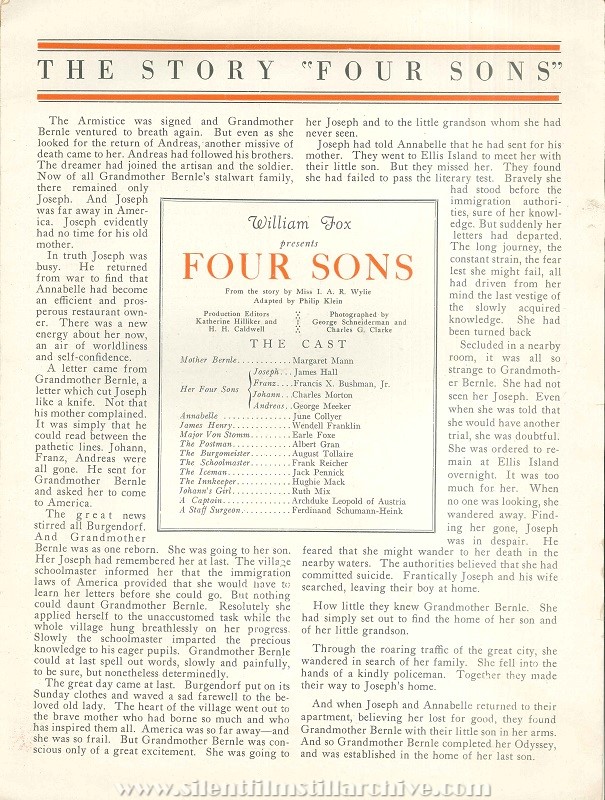
The Armistice was signed and Grandmother Bernle ventured to breath (sic) again. But even as she looked for the return of Andreas, another issive of death came to her. Andreas had followed his brothers. The dreamer had joined the artisan and the soldier. Now of all Grandmother Bernie's stalart family, there remained only Joseph. And Joseph was far away in America. Joseph evidently had no time for his old mother.
In truth, Joseph was busy. He returned from war to find that Annabelle had become an efficient and prosperous restaurant owner. there was a new energy about her now, an air of worldliness and self-confidence.
A letter came from Grandmother Bernle, a letter which cut Joseph like a knife. Not that his mother complained. It was simply that he could read between the pathetic lines. Johann, Franz, Andreas were all gone. He sent for Grandmother Bernle and asked her to come to America.
The great news stirred all Burgendorf. And Grandmother Bernle was as one reborn. She was going to her son. Her Joseph had remembered her at last. The village schoolmaster informed her that the immigration laws of America provided that she would have to learn her letters before she could go. But nothing could daunt Grandmother Bernle. Resolutely she applied herself to the unaccustomed task while the whole village hung breathlessly on her grogress. Slowly the schoolmaster imparted the precious knowledge to his eager pupils. Grandmother Bernle could at last spell out worlds, slowly and painfully, to be sure, but nonetheless determinedly.
The great day came at last. Burgendorf put on its Sunday cothes and waved a sad farewll to the beloved old lady. The heart of the village went out to the brave mother who had borne so much and who has inspired them all. America was so far away -- and she was so frail. But Grandmother Bernle was conscious only of a great excitement. She was going to her Joseph and to the little grandson whom she had never seen.
Joseph had told Annabelle that he had sent for his mother. Tey went to Ellis island to meet her with their little son. But they missed her. They found she had failed to pass the literary test. Bravely she had stood before the immigration authorities, sure of her knowledge. But suddenly her letters had departed. The long journey, the constant strain, the fear lest she might fail, all had driven from her mind the las vestige of the slowly acquired knowledge. She had been turned back.
Secluded in a nearby room, it was all so strange to Grandmother Bernle. She had not seen her Joseph. Even when she was told that she would have another trial, she was doubtful. She was ordered to remain at Ellis Island overnight. It was too much for her. Whe no one was looking, she wandered away. Finding her gone, Joseph was in despair. He feared that she might wander to her death in the nearby waters. The authorities believed that she had committed suicide. Frantically Joseph and his wife search, leaving their boy at home.
How little they knew Grandmother Bernle. She had simply set out to find the home of her son and of her little grandson.
Through the roaring traffic of the great city, she wandered in search of her family. She fell into the hands of a kindly policeman. Together they made their way to Joseph's home.
And when Joseph and Annabelle returned to their apartment, believing her lost for good, they found Grandmother Bernle with their little son in her arms. And so Grandmother Bernle completed her Odyssey, and was established in the home of her last son.
William Fox
presents
FOUR SONS
from the story by Miss I. A. R. Wylie
Adapted by Philip
Klein
Photographed by
George Schneiderman and Charles G.
Clarke
THE CAST
| Mother Bernle | Margaret Mann |
| Joseph | James Hall |
| Franz | Francis X. Bushman, Jr. |
| Johann | Charles Morton |
| Andreas | George Meeker |
| Annabelle | Jone Collyer |
| James Henry | Wendell Franklin |
| Major Von Stomm | Earle Foxe |
| The Postman | Albert Gran |
| The Burgermeister | August Tollaire |
| The Schoolmaster | Frank Reicher |
| The Iceman | Jack Pennick |
| The Innkeeper | Hughie Mack |
| Johann's Girl | Ruth Mix |
| A Captain | Archduke Leopold of Austria |
| A Staff Surgeon | Ferdinand Schumann-Heink |
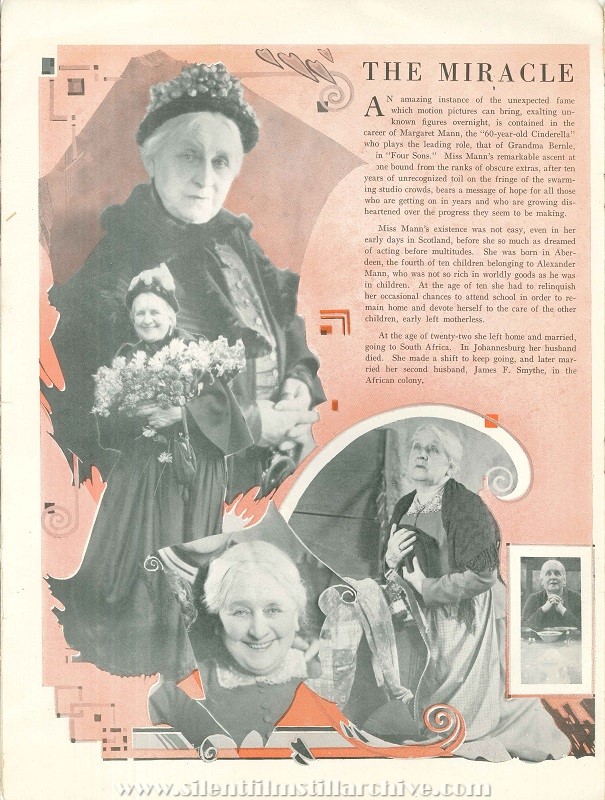
THE MIRACLE OF MARGARET MANN'S TRIUMPH
AN amazing instance of the unexpected fame which motion pictures can bring, exalting unknown figures overnight, is contained in the career of Margaret Mann, the "60-year-od Cinderella" who plays the leading role, that of Grandma Bernle, one bound from the ranks of obscure extras, after then years of unrecognized toil on the fringe of the swarming studio crowds, bears a message of hope for all those who are getting on in years and who are growing disheartened over the progress they seem to be making.
Miss Mann's existence was not easy, even in her early days in Scotland, before she so much as dreamed of acting before ultitudes. She was born in Aberdeen, the fourth of ten children belonging to Alexander Mann, who was not so rich in worldly goods as he was in children. At the age of ten she had to relinquish her occasional chances to attend school in order to remain home and devote herself to the care of the other children, early left motherless.
At the age of twenty-two she left home and married, going to South Afric. In Johannesburg her husband died. She made a shift to keep going, and later married her second husband, James F. Smythe, in the African colony.
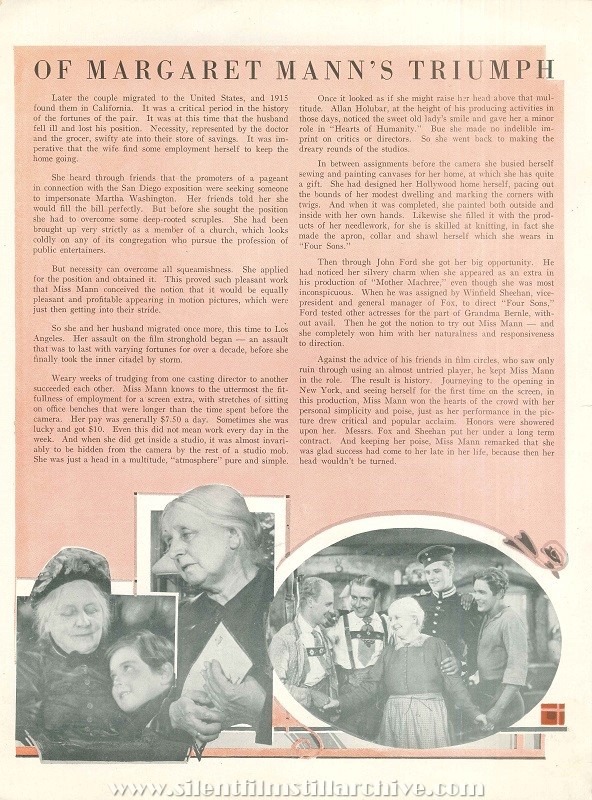
Later the couple migrated to the United States, and 1915 found them in California. It was a critical period in the historu of the fortunes of the pair. It was at this time that the husband fell ill and lost his position. Necessity, represented by the doctor and the grocer, swiftly ate into their store of savings. It was imperative that the wife find some employment herself to keep the home going.
She heard through friends that the promoters of a pageant in connection with the San Diego exposition were seeking someone to impersonate Martha Washington. her friends told her she would fill the bill perfectly. But before she wought the position she had to overcome some deep-rooted scruples. She had been brought up very strictly as a member of a church, which looks coldly on any of its congregation who pursue the profession of public entertainers.
But necessity can overcome all squeamishness. She applied for the position and obtained it. The proved such pleasant work that Miss Mann conceived the notion that it would be equally pleasant and profitable appearing in motion pictures, which were just then getting into their stride.
So she and her husband migrated once more, this time to Los Angeles. her assault on the film stronghold began -- an assault that was to last with varying fortunes for over a decade, before she finally took the inner circle by storm.
Weary weeks of trudging from one casting director to another succeeded each other. Miss Mann knows to the uttermost the fitfullness of employment for a screen extra, with stretches of sitting on office benches that were longer than the time spent before the camera. Her pay was generally $7.50 a day. Some times she was lucky and got $10. Even this did not mean work every day in the week. And when she did get inside a studio, it was almost invariably to be hidden from the camera by the rest of a studio mob. She was just a head in a multitude, "atmosphere" pure and simple.
Once it looked as if she might raise her head above that multitude. Allan Holubar, at the height of his producing activities in those days, noticed the sweet old lady's smile and gave her a minor role in "Hearts of Humanity." Bue (sic) she made no indelible imprint on critics or directors. So she went back to making the dreary rounds of the studios.
In between assignments before the camera whe busied herself sewing and painting canvases for her home, at which she has quite a gift. She had designed her Hollywood home hefself, pacing out the bunds of her modest dwelling and marking the corners with twigs. And when it was completed, she painted both outside and inside with her own hands. Likewise she filled it with the products of her needlework, for she is skilled at knitting, in fact she made the apron, collar and shawl herself which she wears in "Four Sons."
Then through John Ford she got her big opportunity. he had noticed her silvery charm when she appeared as an extra in his production of "Mother Machree," even though she was most inconspicuous. When he was assigned by Winfield Sheehan, vice-president and general manager of Fox, to direct "Four Sons," Ford tested other actresses for the part of Grandma Bernle, without avail. Then he got the notion to try out Miss Mann -- and she completely won him with her naturalness and responsiveness to direction.
Against the advice of his friends in film circles, who saw only ruin through using an almost untried player, he kept Miss Mann in the role. The result is history. Journeying to the opening in New York, and seeing herself for the first time on the screen, Miss Mann won the hearts of the crowd with her personal simplicity and poise, just as her performance in the picture drew critical and popular acclaim. Honors were showered upon her. Messrs. Fox and Sheehan put her under a long term contract. And keeping her poise, Miss Mann remarked that she was glad success had come to her late in her life, because then her head wouldn't be turned.
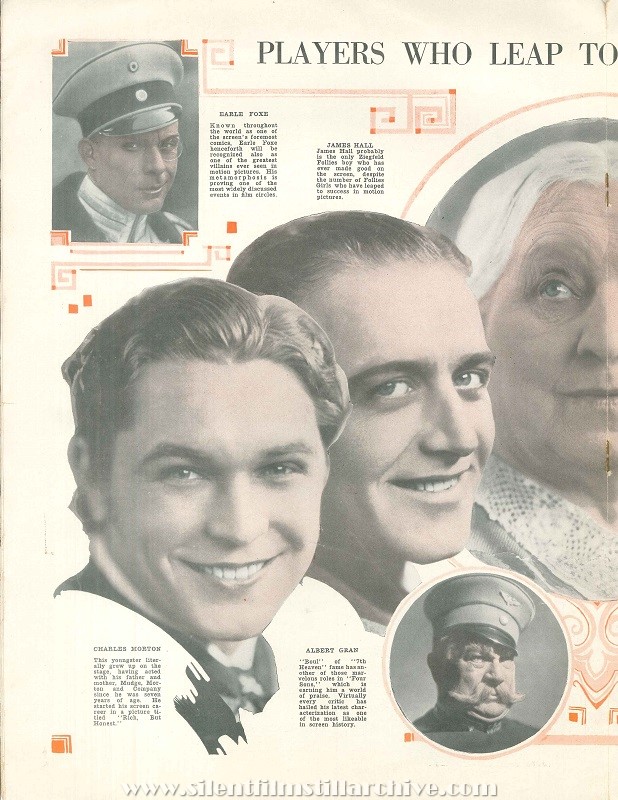
THE PLAYERS WHO LEAP TO FAME IN "FOUR SONS"
EARLE FOX
Known throughout the world as one of the
screen's foremost comics, Earle Foxe henceforth will be recognized also
as one of the greatest villains ever seen in motion pictures. His metamorphosis
is proving one of the most widely discussed events in film circles.
JAMES HALL
James Hall probably is the only Ziegfeld
Follies boy who has ever made good on the screen, despite the number of
Follies Girls who have leaped to success in motion pictures.
CHARLES MORTON
This youngster literally grew up on
the stage, having acted with his father and mother, Mudge, Morton and Company
wince he was seven years of age. He started his screen career ina picture
titled "Rich, But Honest."
ALBERT GRAN
"Boul" of "7th Heaven"
fame has another of those marvelous roles in "Four Sons," which
is earning him a world of praise. Virtually every critic has hailed his
latest characterization as one of the most likeable in screen history.
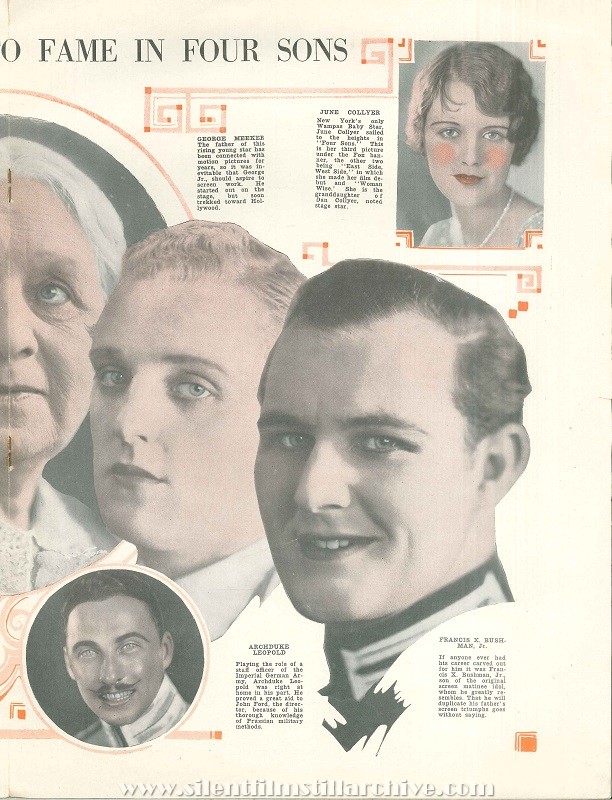
GEORGE MEEKER
The father of this rising young star
has been conneced with motion pictures for years, so it was inevitable that
George Jr., should aspire to screen work. He started out on the stage, but
soon trekked toward Hollywood.
JOE COLLYER
New York's only Wampas Baby Star, June
Collyer sailed to the heights in "Four Sons." This is her third
picture under the Fox banner, the other two being "East Side, West
Side," in which she made her film debut and "Woman Wise."
She is the granddaughter of Dan Collyer, noted stage star.
ARCHDUKE LEOPOLD
Playing the role of a staff officer
of the Imperial Geran Army, Archduke Leopold was riht at home in his part.
He proved a great aid to John Ford the director, ecause of his thorough
knowledge of Prussian military methods.
FRANCIS X. BUSHMAN, Jr.
If anyone ever had his career
carved out for him it was Francis X. Bushman, Jr., son of the original screen
matinee idol, who he greatly resembles. That he will duplicate his father's
screen triumphs goes without saying.
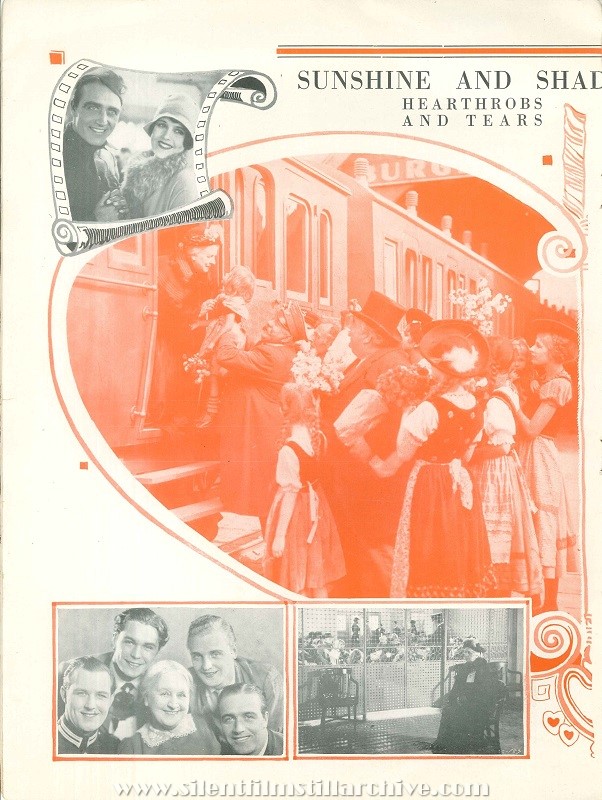
SUNSHINE AND SHADOWS IN "FOUR SONS"
HEARTHROBS AND TEARS
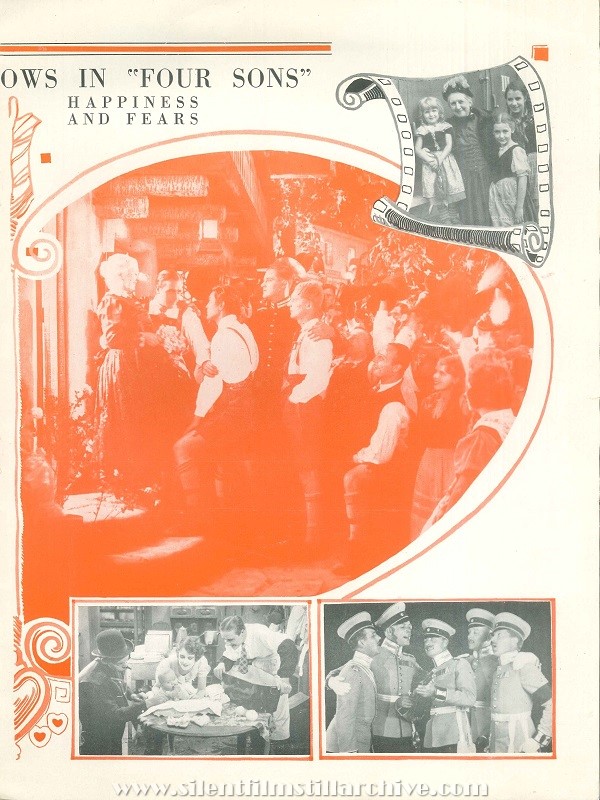
HAPPINESS AND FEARS
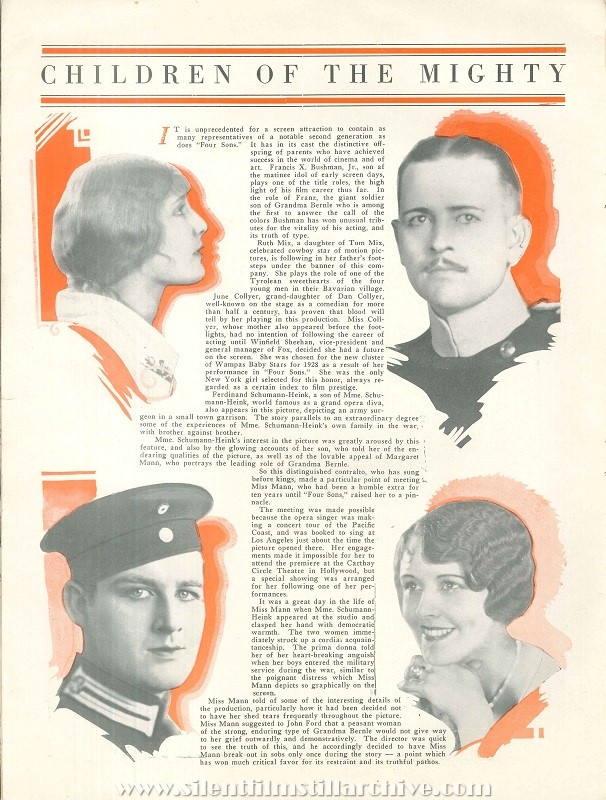
CHILDREN OF THE MIGHTY
IT is unprecendented for a screen attraction to contain as many representatives of a notable second generation as does "Four Sons". It has in its cast the distinctive offspring of parents who have achieved success in the world of cinema and of art. Francis X. Bushman, Jr., son of the matinee idol of early screen days, plays one of the title roles, the highlight of his film career thus far. In the role of Franz, the giant soldier son of Grandma Bernle who is among the first to answer the call of the colors, Bushman has won unusual tributes for the vitality of his acting, and its truth of type.
Ruth Mix, a daughter of Tom Mix, celebrated cowboy star of motion pictures, is following in her father's footsteps under the banner of this compan. She plays the role of one of the Tyrolean sweethearts of the four young men in their Bavarian village.
June Collyer, grand-daughter of Dan Collyer, well-known on the stage as a comedian for more than half a century, has proven that blood will tell by her playing in this production. Miss Collyer, whose mother also appeared before the footlights, had no intention of following the career of acting until Winfield Sheehan, vice-president and general manager of Fox, decided she had a future on the screen. She was chosen for the new cluster of Wampas Baby Stars for 1928 as a result of her performance in "Four Sons." She was the only New York girl selected for this honor, always regarded as a certain index to film prestige.
Fedinand Scumann-Heink, a son of Mme. Schumann-Heink, world famous as a grand opera diva, also appears in this picture, depicting an army surgeon in a small town garrison. The story parallels to an extraordinary degree some of the experiences of Mme. Schumann-Heink's own family in the war with brother against brother.
Mme. Schumann-Heink's interest in the picture was greatly aroused by this feature, and also by the flowing accounts of her son, who told her of the endearing qualities of the picture, as well as of the lovable appeal of Margaret Mann, who portrays the leading role of Grandma Bernle.
So this distinguished contralto, who has sung before kings, made a particular point of meeting Miss Mann, who had been a humble extra for ten years until "Four Sons" raised her to a pinnacle.
The meeting was made possible because the opera singer was making a concert tour of the Pacific Coast, and was booked to sing at Los Angeles just about the time the picture opened there. Her engagements made it impossible for her to attend the premiere at the Carthay Circle Theatre in Hollywood, but a special showing was arranged for her following one of her performances.
It was a great day in the life of Miss Mann when Mme. Schumann-Heink appeared at the studio and clasped her hand with democratic warmth. The two women immediately struck up a cordial acquaintanceship. The prima donna told her of her heart-breaking anguish when her boys entered the military service during the war, similar to the poignant distress which Miss Mann depicts so graphically on the screen.
Miss Mann told of some of the interesting details fo the production, particularly how it had been decided not to have her shed tears frequently throughout the picture. Miss Mann suggested to John Ford that a peasant woman of the strong, enduring type of Grandma Bernle would not give way to her grief outwardly and demonstratively. The director was quick to see the truth of this, and he accordingly decided to have Miss Mann break out in sobs only once during the story -- a point which has won much critical favor for its restraint and its truthful pathos.
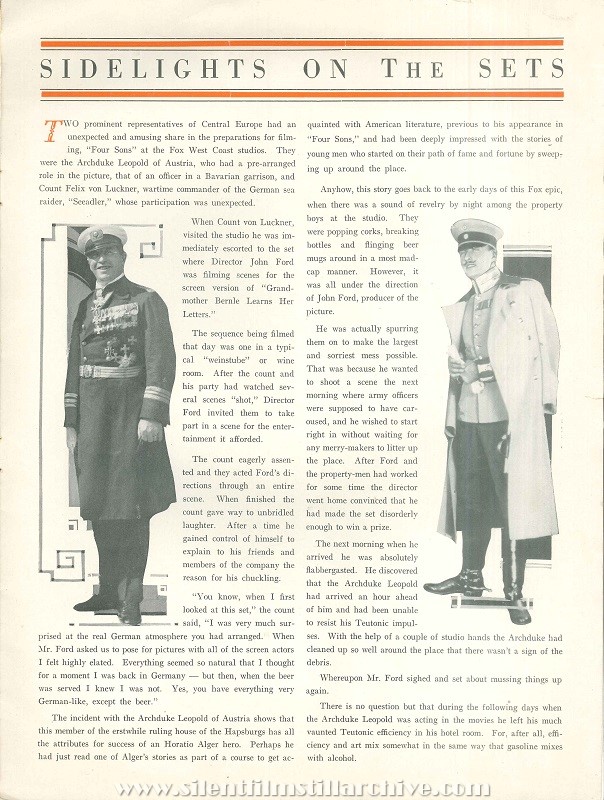
SIDELIGHTS ON THE SETS
TWO promminent representatives of Central Europe had an unexpected and amusing share in the preparations for filming, "For Sons" at the Fox West Coast studios. Theywere the Archduke Leopold of Austria, who had a pre-arranged role in the picture, that of an officer in a Bavarian garrison, and Count Felix von Luckner, wartime commander of the German sea raider, "Seeadler," whose participation was unexpected.
When Count von Luckner visited the studio he was immediately escorted to the set where Director John Ford was filming scenes for the screen verion of "Grandmother Bernle Learns Her Letters."
The sequence being filmed that day was one in a typical "weinstube" or wine room. After the count and his party had watched several scenes "shot," Director Ford invited them to take part in a scene for the entertainment it afforded.
The count eagerly assented and they acted Ford's directions through an entire scene. When finished the count gave way to unbridled laughter. After a time he gained control of himself to explain to his friends and members of the company the reason for his chuckling.
"You know, when I first looked at this set," the count said, "I was very much surprised at the real Geran atmosphere you had arranged. Whe Mr. Ford asked us to pose for pictures with all of the screen actors I felt highly elated. Everything seemed so natural that I thought for a moment I was back in Germany -- but then, when the beer was served I knew I was not. Yes, you have everything very German-like, except the beer."
The incident with the Archduke of Austria shows that this member of the erstwhile ruling house of the hapsburgs has all the attributes for success of an Horatio Alger hero. Perhaps he had just read one of Alger's stories as part of a course to get acquainted with American literature, previous to his appearance in "Four Sons," and had been deeply impressed with the stories of young men who started on their path of fame and fortune by sweeping up around the place.
Anyhow, this story goes back to the early days of this Fox epic, when there was a sound of revelry by night among the property boys at the studio. They were popping corks, breaking bottles and flinging beer mugs around in a most madcap manner. However, it was all under the direction of John Ford, producer of the picture.
He was actually spurring them on to make the largest and sorriest mess possible. That was because he wanted to shoot a scene the next morning where army officers were supposed to have caroused, and he wished to start right in without waiting for any merry-makers to litter up the place. After Ford and the property-men had worked for some time the director went home convinced that he had made the set dirorderly enough to win a prize.
The next morning when he arrived he was flabbergasted. He discovered that the Archduke Leopold had arrived an hour ahead of him and had been unable to resist his Teutonic impulses. With the help of a couple of studio hands the Archduke had cleaned up so well around the place that there wasn't a sign of the debris.
Whereupon Mr. Ford sighed and set about mussing things up again.
There is no question but that during the following days then the Archduke Leopold was acting in the movies he left his much vaunted Teutonic efficiency in his hotel room. For, after all, efficiency and art mix somewhat in the same way that gasoline mixes with alcohol.
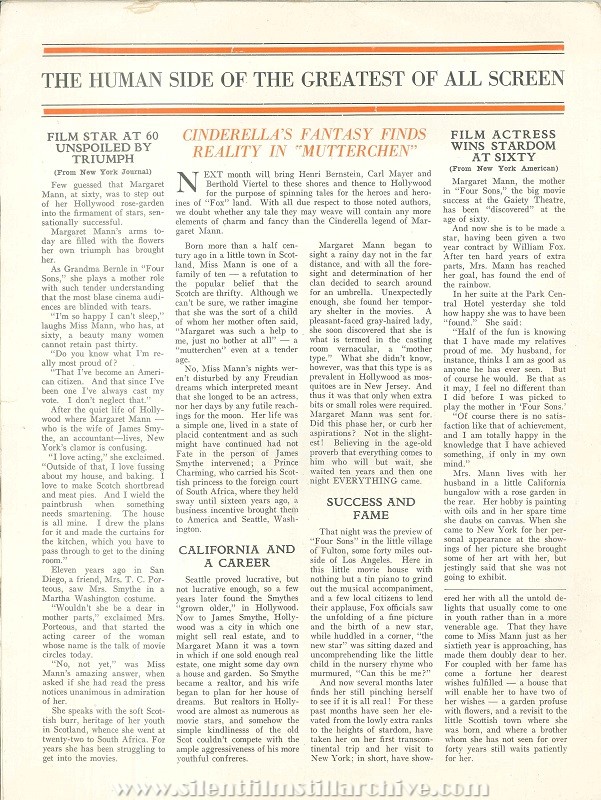
THE HUMAN SIDE OF THE GREATEST OF ALL SCREEN MOTHERS AS SEEN BY N. Y. FEATURE WRITERS
FILM STAR AT 60 UNSPOILED BY TRIUMPH
(From New York Journal)
Few guessed that Margaret Mann, at sixty, was to step out of her Hollywood rose-garden into the firmament of stars, sensationally successful.
Margaret Mann's arms today are filled with the flowers her own triumph has brought her.
As Grandma Bernle in "Four Sons," she plays a mother role with such tendder understanding that the most blase cinema audiences are blinded with tears.
"I'm so happy I can't sleep," laughs Miss Mann, who has, at sixty, a beauty many women cannot retain past thirty.
"Do you know what I'm really most pround of?"
"That I've become an American citizen. And that since I've been one I've always cast my vote. I don't neglect that."
After the quiet life of Hollywood where Margaret Mann -- who is the wife of James Smythe, an accountant -- lives, New York's clamor is confusing.
"I love acting," she exclaimed. "Outside of that, I love fussing about my ouse, and baking. I love to make Scotch shortbread and meat pies. And I wield the paintbrush when something needs smartening. The house is all mine. I drew the plans for it and made the curtains for the kitchen, which you have to pass through to get to the dining room."
Eleven years ago in San Diego, a friend, Mrs. T. C. Porteous, and that started the acting career of the woman whose name is the talk of movie circles today.
"no, not yet," was Miss Mann's amazing answer, when asked if she had read the press notices unanimous in admiration of her.
She speaks with the soft Scottish burr, heritage of her youth in Scotland, whence she went at twenty-two to South Africa. For years she has been struggling to get into the movies.
CINDERELLA'S FANTASY FINDS REALITY IN "MUTTERCHEN"
NEXT month will bring Henri Bernstein, Carl Mayer and Berthold Viertel to these shores and thence to Hollywood for the purpose of spinning tales for the heroes and heroines of "Fox" land. With all due respect to those noted authors, we dout whether any tale they ay weave will contain any more elements of charm and fancy than the Cinderella legent of Margaret Mann.
Born more than a half century ago in a little town in Scotland, Miss Mann is one of a family of ten -- a refutation to the popular belief that the Scotch are thrifty. Although we can't be sure, we rather imagine that she was the sort of a child of whom her mother often said, "Mararet was such a help to me, just no bother at all" -- a "mutterchen" even at the tender age.
No, Miss Mann's night weren't disturbed by any Freudian dreamms which interpreted meant that she longed to be an actress, nor her days by any futile reachings for the moon. Her life was a simple one, lived in a state of placid contentment and as such might have continued had not Fate in the person of James Smythe intervened; a Prince Charming, who carried his Scottish princess to the foreign court of South Africa, where they held sway until sixteen years ago, a business incentive brought them to America and Seattle, Washington.
CALIFORNIA AND A CAREER
Seattle proved lucrative, but not lucrative enough, so a few years later found the Smythes "grown older," in Hollywood. Now to James Smythe, Hollywood was a city in which one might sell real estate, and to Margaret Mann it was a town in which if one sold enough real estate, one might some day own a house and garden. So Smythe became a realtor, and his wife began to plan for her house of dreams. But realtors in Hollywood are almost as numerous as movie stars, and somehow the simple kindliness of the old Scot couldn't compete with the ample aggressiveness of his more youthful confreres. Margaret Mann began to sight a rainy day not in the far distance, and with all the foresight and deterination of her clan decided to search around for an umbrella. Unexpectedly enough, she found her temporary shelter in the movies. A pleasant-faced gray--haired lady, she soon discovered that she is what is termed in the casting room vernacular, a "mother type." what she didn't know, however, was that this type is prevalent in Hollywood as the mosquitoes are in New Jersey. And thus it was that only when etra bits or small roles were required. Margaret Mannn was sent for. Did this phase her, or curb her aspirations? Not in the slightest! Believing in the age-old proverb that everything comes to him who will but wait, she waited ten years and then one night EVERYTHING came.
SUCCESS AND FAME
That night was the preview of "Four Sons" in the little village of Fulton, some forty miles outside of Los Angeles. Here in this little ovie house with nothing but a tine piano to grind out the usical accopaniment, and a few local citizens to lend their applause, Fox officials saw the unfolding of a fine pictured the virth of a new star, while huddles in a corner, "the new star" was sitting dazed and uncomprehending like the little child in the nursery rhyme who murured, "Can this be me?"
And now several months later finds her still pinching herself to see if it is all real! For these past months have seen her elevated from the lowly extra ranks to the heights of stardom, have taken her on her first transcontinental trip and her visit to New York; in short, have showered her with all the untold delights that usually come to one in youth rather then in a more venerble age. That they have come to Miss mann just as her sixtieth year is approaching, has made them doubly dear to her. For cupled with her fame as come a fortune her dearest wishes fulfilled -- a garden profuse with flowers, and a revisit to the little Scottish town where she was born, and where a brother whom she has not seen for over forty years still waits patiently for her.
FILM ACTRESS WINS STARDOM AT SIXTY
(From New York American)
Margaret Mann, the mother in "Four Sons," the big movie success at the Gaiety Theatre, has been "discovered" at the age of sixty.
And now she is to be made a star, having been given a two year contrac by William Fox. After ten hard years of extra parts, Mrs. Mann has reached her goal, has found the end of the rainbow.
In her suite at the Park Cetral Hotel yesterday she told how happy she was to have been "found." She said:
"Half of the fun is knowing that I have made my relatives proud of me. My husband for instance, thinks I as as good as anyone he has ever seen. But of course he would. Be that as it may, I feel no different than I did before I was picked to play the mother in 'Four Sons.'
"Of course there is no satisfaction like that of achievement, and I am totally happy in the knowledge that I have achieved something, if only in my own mind."
Mrs. Mann lives with her husand in a little California bungalow with a rose garden in the rear. Her hobby is painting with oils and in her spare time she daubs on canvas. When she came to New York for her personal appearance at the showings of picture she brought some of her art with her, but jestingly said that she was not going to exhibit.
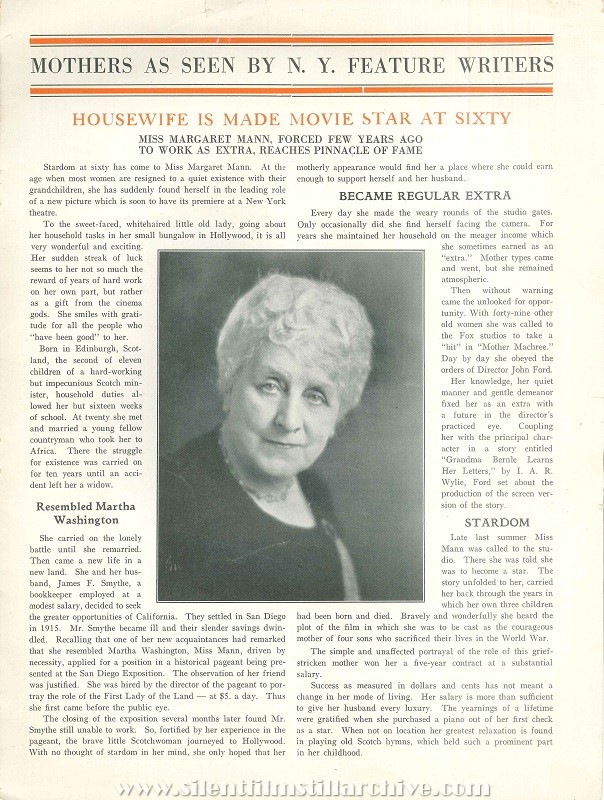
HOUSEWIFE IS MADE MOVIE STAR AT SIXTY
MISS MARGARET MANN, FORCED FEW YEARS AGO TO WORK AS EXTRA, REACHES PINNACLE OF FAME
Stardom at sixty has come to Miss Margaret Mann. At the age when most women are resigned to a quiet existence with their grandchildren, she has suddenly found herself in the leading role of a new picture which is soon to have its premiere at a New York theatre.
To the sweet-faced, whitehaired little old lady, going about her household tasks in her small bungalow in Hollywood, it is all very wonderful and exciting. Her sudden streak of luck seems to her not so much the reward of years of hard work on her own part, but rather as a gift from the cinema gods. She smiles with gratitude for all the people who "have been good" to her.
Born in Edinburgh, Scotland, the second of eleven children of a hard-working but impecunious Scotch minister, household duties allowed her but sixteen weeks of school. At twenty she met and married a young fellow countryman who took her to Africa. There the struggle for existence was carried on for ten years until an accident left her a widow.
Resembled Martha Washington
She carried on the lonely battle until she remarried. Then came a new life in a new land. She and her husband, James F. Smythe, a bookkeeper employed at a modest salary, decided to seek the greater opportunities of California. They settles in San Diego in 1915. Mr. Smythe became ill and their slender savings dwindled. Recalling that one of her new acquaintances had remarked that she resembled Martha Washington, Miss Mann, driven by necessity, applied for a position in a historical pageant being presented at the San Diego Exposition. The observation of her friend was justified. She was hired by the director of the pageant to portray the role of the First Lady of the Land -- at $5 a day. The she first came before the public eye.
The closing of the exposition several months later found Mr. Smythe still unable to work. So, fortified by her experience in the pageant, the brave little Schtchwoman, journey to Hollywood. With no thought of stardom in her mind, she only hoped that her motherly appearance would find her a plac where she could earn enough to support herself and her husband.
BECAME REGULAR EXTRA
Every day she made theweary rounds of the studio gates. Only occasionally did she find herself facing the camera. For years she maintained her household on the meager income which she sometimes earned as an "extra." Mother types came and went, but she remained atmospheric.
Then without warning came the unlooked for opportunity. With fourty-nine other old women she was called to the Fox studios to take a "bit" in "Mother Machree." Day by day she obeyed the orders of Director John Ford.
Her knowledge, her quiet manner and gentle demeanor fixed her as an extra with a future in the director's parcticed eye. Coupling her with the principal characer in a story entitled "Granda Bernle Learns Her Letters," by I. A. R. Wylie, Ford set about the production of the screen version of the story.
STARDOM
Late last summer Miss Mann was called to the studio. There she was told she was to becoe a star. The story unfolded to her, carried her back through the years in which he own three children had been born and died. Bravely and wonderfully she heard the plot of the film in which she was to be cast as the courageous mother of four sons who sacrificed their lives in the World War.
The simple and unaffected portrayal of the role of this grief-stricken mother won her a five-year contract as a substantial salary.
Success as measured in dollars and cents has not meant a change in her mode of living. Her salary is more than sufficient to give her husband every luxury. The yearnings of a lifetime were gratified when she purchased a piano out of her first check as a star. When not on location her greatest relaxation is found in plying old Scotch hymns, which held such a prominent par in her childhood.
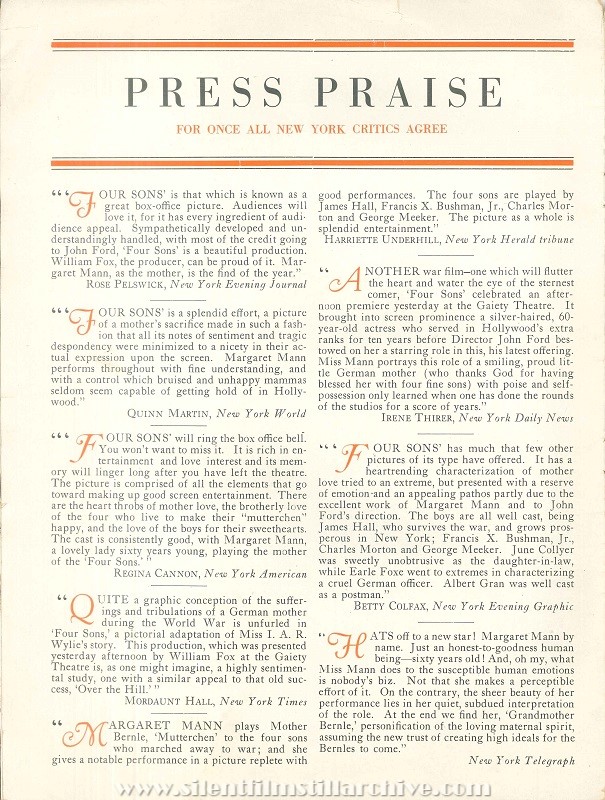
PRESS PRAISE
FOR ONCE ALL NEW YORK
CRICITCS AGREE
"'FOUR SONS' is that which is known as a great box-office
picture. Audiences will love it, for it has every ingredient of audience
appeal. Sympathetically developed and understandingly hadled, with most
of the credit going to John Ford. 'Four Sons' is a beautiful production.
William Fox, the producer, can be proud of it. Margaret Mann, as the mother,
is the find of the year."
ROSE PELSWICK, New York Evening Journal
"FOUR SONS" is a splendid effort, a picture
of a mother's sacrifice made is such a fashion that all its notes of sentiment
and tragic despondency, were miimized to a nicety in their actual expression
upon the screen. Margaret Mann performs throughout with fine understanding,
and with a control which bruised and unhappy mammas seldom seen capable
of getting hold of in Hollywood."
QUINN MARTIN, New York World
"'FOUR SONS' will ring the box office bell. You won't
want to miss it. It is rich in entertainment and hove interest and its memory
will linger long after you have left the theatre. The picture is comprised
of all the elements that go toward making up good screen entertainment.
There are the heart throbs of mother love, the brotherly love of the four
who live to make their "mutterchen" happy, and the love of the
boys for their sweethearts. The cast is consistently good, with Margaret
Mann, a lovely lady sixty years young, playing the mother of the 'Four Sons.'"
REGINA CANNON, New York American
"QUITE a graphic conception of the sufferings and
tribulations of a German mother during the World War is unfurled in 'Four
Sons', a pictorial adaptation of Miss I. A. R. Wyie's story. The production,
which was presented yesterday afternoon by William Fox at the Gaiety Theatre
is, as one might imagine, a highly sentimental study, one with a similar
appeal to that old success, 'Over the Hill.'"
MORDAUNT HALL,
New York Times
"MARGARET MANN plays Mother Bernie, 'Mutterchen'
to the four sons who marched away to war; and she gives a notable performance
in picture replete with good performances. The four sons are played by James
Hall, Francis X. Bushman, Jr., Charles Morton and George Meeker. The picture
as a whole is splendid entertainment."
HARRIETTE UNDERHILL,
New York Herald tribune
"ANOTHER war film -- one which will flutter the heart
and water the eye of the sternest comer, 'Four Sons' celebrated an afternoon
premiere yesterday at the Gaiety Theatre. It brought into screen prominence
a silver-haired, 60-year-old actress who served in Hollywood's extra ranks
for ten years before Director John Ford bestowed on her a starring role
in this, his latest offering. Miss Mann portrayes this role of a smiling,
proud little German mother (who thanks God for having blessed her with four
fine sons) with poise and self-possession only learned when one has done
the rounds of the studios for a score of years."
IRENE THIRER, New
York Daily News
"'FOUR SONS' has much that few other pictures of
its type have offered. It has a heartrending characterization of mother
love tried to an extreme, but presented with a reserve of emotion and an
appealing pathos partly due to the Ford's direction. The boys are all well
case, being James Hall, who survives the war, and grows propserous in New
Yor; Francis X. Bushman, Jr., Charles Morton and George Meeker. June Collyer
was sweetly unobtrusive as the daughter-i-law, while Earle Fox went to extremes
in characterizig a cruel German officer. Albert Gran was well case as a
postman." that John "was too ill to appear."
BETTY COLFAX,
New York Evening Graphic
"HATS off to a new star! Margaret Mann by name. Just
an honest-to-goodness human being -- sixty years old! And, oh my, what Miss
Mann does to the susceptible human emotions is nobody's biz. Not that she
makes a perceptible effort of it. On the contrary, the sheer beauty of her
performance lies in her quiet, subdued interpretation of the role. At the
end we find her, 'Grandmother Bernle,' personification of the loving maternal
spirit, assuming the new trust of creating high ideals for the Bernles to
come."
New York Telegraph
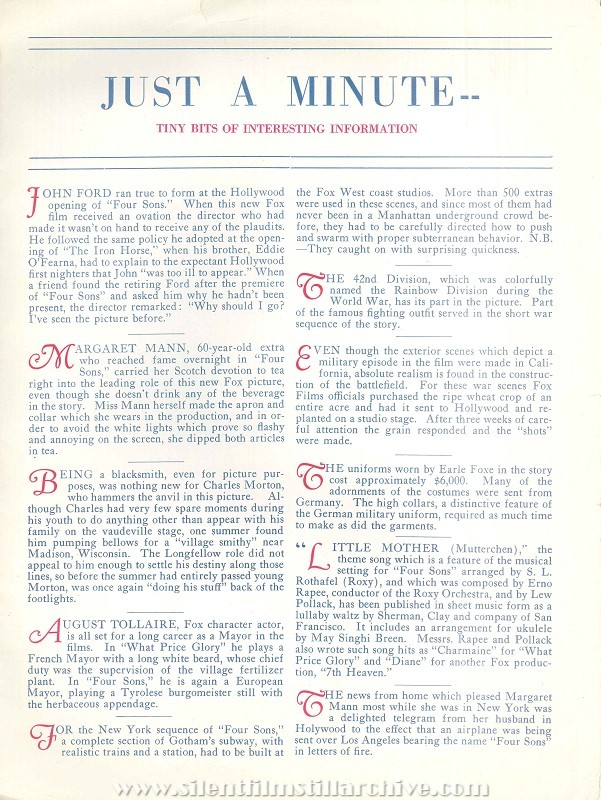
JUST A MINUTE --
TINY BITS OF INTERESTING
INFORMATION
JOHN FORD ran true to form at the Hollywood opening of "Four Sons." When this new Fox film received an ovation the director who had made it wasn't on hand to receive any of the plaudits. He followed the same policy he adopted at the opening of "The Iron Horse," when his brother, Eddie O'Ferna, had to explain to the expectant Hollywood first nighters that John "was too ill to appear." When a friend found the retiring Ford after the premiere of "Four Sons" and asked him why he hadn't been present, the director remared: "Why should I go? I've seen the picture before."
MARGARET MANN, 60-year-old extra who reached fame overnight in "Four Sons," carried her Scotch devotion to teat right into the leading role of this new Fox picture, even though she doesn't drink any of the beverage in the story. Miss Mann herself made the apron and collar which she wears i the producion, and in order to avoid the white lights which prove so flashy and annoying on the screen, she dipped both articles in tea.
BEING a blacksmith, even for picture purposes, was nothing new for Charles Morton, who hammers the anvil in this picture. Although Charles had very few spare moments during his youth to do anything other than appear with his faily on the vaudeville stage, one summer found him pumping bellows for a "village smith" near Madison, Wisconsin. The Longfellow role did not appeal to him enough to settle his destiny along those lines, so before the summer had entirely passed young Morton, was once again "doing his stuff" back of the footlights.
AUGUST TOLLAIRE, Fox character actor, is all set for a long career as a Mayor in the films. In "What Price Glory, he plays a French Mayor with a long whit ebeard, whose chief duty was the supervision of the village fertilizer plant. In "Four Sons," he is again a European mayor, playing a Tyrolese burgomeister still with the herbaceous appendage.
FOR the New York sequence of "Four Sons," a complete section of Gotham's subway, with realistic trains and a station, had to be built at the Fox West coast studios. More than 500 extras were used in these scenes, and since most of them had never been in a Manhattan underground crowd before, they had to be carefully directed how to push and swarm with proper subterranean behavior, N.B. -- They caught on with surprising quickness.
THE 42nd Division, which was coorfully named the Rainbow Division during the World War, has its part in the picture. Part of the famous fightig outfit served in the short war sequence of the story.
EVEN though the exterior scenes which depict a military episode in the film were made in California, absolute realism is found in the construcion of the battlefield. For these war scenes Fox Films officials urchased the ripe wheat crop of an entire acre and had it sent to Holywood and replanted on a studio stage. After three weeks of careful attention the grain responded and the "shots" were made.
THE uniforms worn by Earle Foxe in the story cost approximately $6,000. Many of the adorments of the costues were sent from Germany. The high collars, a distinctive feature of the German military uniform, required as much time to make as did the garments.
"LITTLE MOTHER (Mutterchen)," the theme song which is a feature of the musical setting for "Four Sons" arranged by S. L. Rothafel (Roxy), and which was composed by Erno Rapee, coductor of the Roxy Orchestra, and by Lew Pollack, has been published in sheet music form as a lullaby waltz by Sherman, Clay and company of San Francisco. It includes an arrangement for ukulele by May Singhi Breen. Messrs. Rapee and Pollack also wrote such song hits as "Charmaine" for "What Price Glory" and "Diane" for another Fox prodction, "7th Heaven."
THE news from home which pleased Margaret Mann most while she was i New York was a delighted telegram from her husband in Holywood (sic) to the effect that an airplane was being sent over Los Angeles bearing the name "Four Sons" in letters of fire.
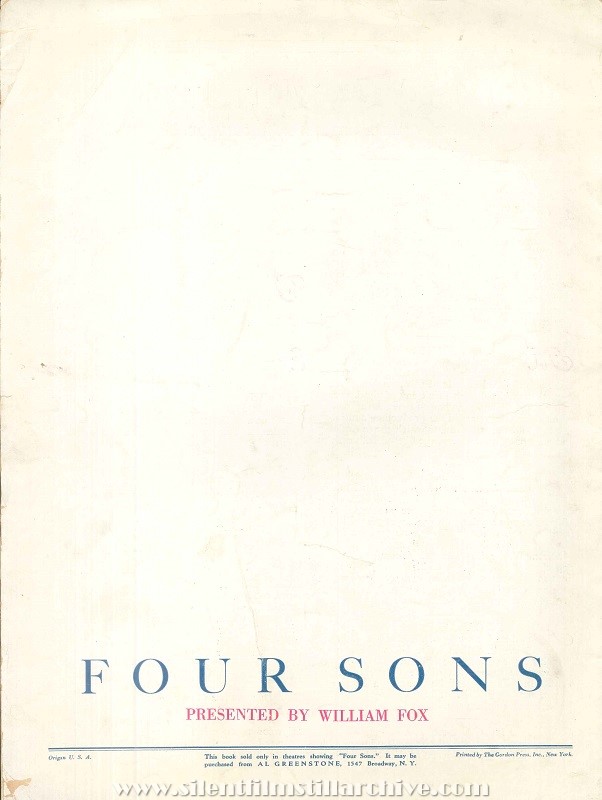
FOUR SONS
PRESENTED BY WILLIAM FOX
This book sold only in theaters showing "Four Sons." It may be purchased from AL GREENSTONE, 1547 Broadway, N. Y.
Origin U. S. A.
Printed by The Gordon Press, Inc.,
New York.
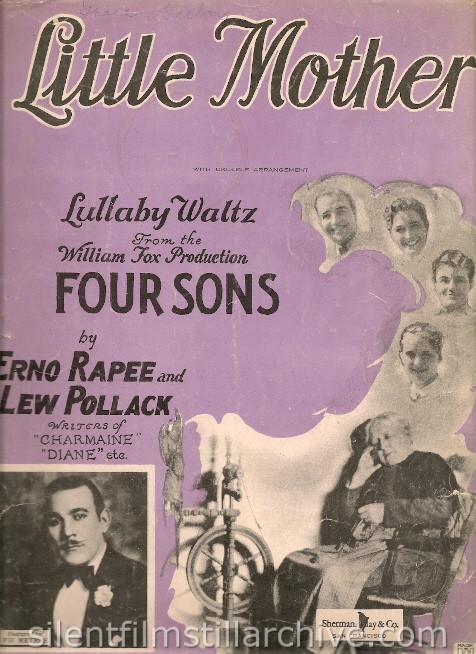
Little Mother
with Ukulele Arrangement
Lullaby Waltz
from the William Fox Production
FOUR SONS
by
Erno Rapee and Lew Pollack
Writers of "Charmaine", "Diane",
etc.
Featured by Vic Meyers
Sherman, May & Co.
San Francisco
with Margaret Mann, James Hall and Charles Morton. Directed by John Ford. Fox.
More Information on this film...
Books
None
Last Modified April 26, 2021



















